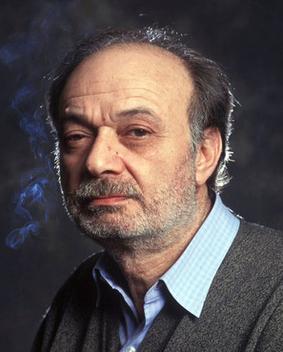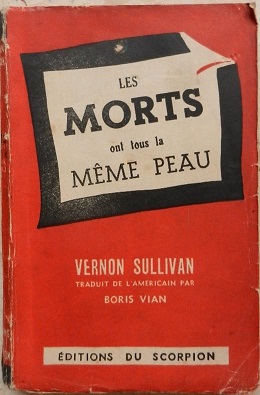
Françoise d'Eaubonne was a French author, labour rights activist, environmentalist, and feminist. Her 1974 book, Le Féminisme ou la Mort, introduced the term ecofeminism. She co-founded the Front homosexuel d'action révolutionnaire, a homosexual revolutionary alliance in Paris.

Boris Vian was a French polymath who is primarily remembered for his novels. Those published under the pseudonym Vernon Sullivan were bizarre parodies of criminal fiction, highly controversial at the time of their release due to their unconventional outlook.
This article contains information about the literary events and publications of 1946.

Claude Berri was a French film director, writer, producer, actor and distributor.

Boubacar Boris Diop is a Senegalese novelist, journalist and screenwriter. His best known work, Murambi, le livre des ossements, is the fictional account of a notorious massacre during the Rwandan genocide of 1994. He is also the founder of Sol, an independent newspaper in Senegal, and the author of many books, political works, plays and screenplays. Doomi Golo (2003) is one of the only novels ever written in Wolof; it deals with the life of a Senegalese Wolof family. The book was published by Papyrus Afrique, Dakar.

Juliette Gréco was a French singer and actress. Her best known songs are "Paris Canaille", "La Javanaise" and "Déshabillez-moi" (1967). She often sang tracks with lyrics written by French poets such as Jacques Prévert and Boris Vian, as well as singers like Jacques Brel and Charles Aznavour. Her 60-year career came to an end in 2015 when she began her last worldwide tour titled "Merci".
Christian Henri Marquand was a French actor.

Philippe Blanchard, known professionally as Philippe Katerine, is a French singer-songwriter, actor, director and writer who began his career in 1991. Some of his popular singles include "Mon cœur balance", "Je vous emmerde", and "Louxor j'adore".

"Rêver" is a 1995 song recorded by French singer-songwriter Mylène Farmer. It was the fifth single from her fourth album Anamorphosée and was released on 16 November 1996. In spite of moderate sales and chart performances, the song remains one of the most known by the general public because of the subjects it deals with, notably war and a call for tolerance.

Alexandre Astier is a French writer, director, editor, scriptwriter, humorist, actor and composer.
"Je voudrais pas crever" is a collection of poetry by French author Boris Vian, published posthumously in 1962.

Georges-Emmanuel Clancier was a French poet, novelist, and journalist. He won the Prix Goncourt (poetry), the Grand Prize of the Académie française, and the grand prize of the Société des gens de lettres.

Fernand Ledoux was a French film and theatre actor of Belgian origin. He studied with Raphaël Duflos at the CNSAD, and began his career with small roles at the Comédie-Française. He appeared in close to eighty films, with his best remembered role being the stationmaster Roubaud in Jean Renoir's La Bête humaine (1938), but he remained primarily a theatrical actor for the duration of his career.

The Dead All Have the Same Skin is a 1947 crime novel by the French writer Boris Vian. It tells the story of a mixed Black-White American, who manages to have a career in "white society" without anyone knowing of his origin; when his black half-brother turns up and tries to blackmail him by threatening to reveal his origin, his life turns into a downward spiral of violence. It was the second book published under the pseudonym Vernon Sullivan, after I Spit on Your Graves from 1946.

Autumn in Peking is a 1947 novel by the French writer Boris Vian. It was published by Jean d’Halluin's Éditions du Scorpion in 1947 with a second edition at Éditions de Minuit in 1956 which had a drawing by Mose on the cover. It was reissued in 1963 and reprinted a number of times. The French critic Bruno Maillé has described it as a surrealist novel, something the surrealists themselves refuted. However, Alistair Rolls in his study of intertextuality in four novels of Boris Vian argues the novel contains many surrealist elements and techniques. The Peking of the title is not literal; if anywhere the location of the novel's main action is a “dream-desert” allowing Vian to play with visual extremes of searing light and heat as well as intense blackness and night. It takes place in an imaginary desert called Exopotamie where a train station and a railway line are under construction. Pestereaux argued that Peking was simply slang for Paris; an allegory of Paris post WW2 reconstruction and the insanity of its bureaucracy.
The Orobians are a ska band founded during 1997 in Bergamo, Italy and still based in Bergamo. They play ska and rocksteady standards with a modern jazz twist.
Alfred-Adolphe Pasquali was a French actor and theatre director.
Lud Germain, "Ludovic Germain" was a Haitian actor and singer, probably naturalized French. He is best known for his role in L'Auberge Rouge (1951) as Fétiche.

Raymond Guiot is a French flautist, pianist and composer. He has also trained many flutists throughout the world.
Avital Inbar is an Israeli author, translator, journalist, and restaurant critic.













